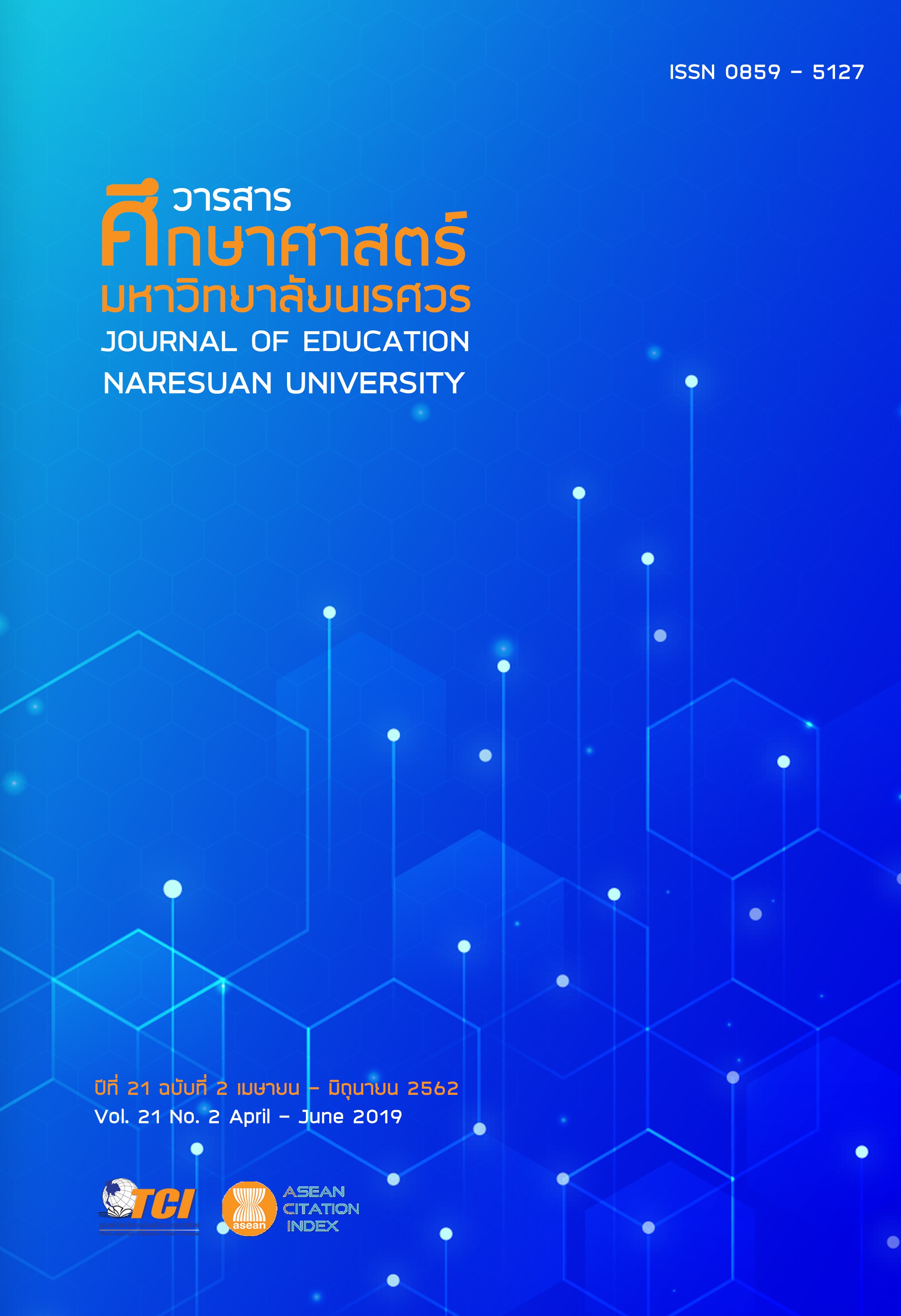การพัฒนาสมรรถนะการทำวิจัยเชิงปฏิบัติการของนักศึกษาครูโดยใช้แนวคิดการจูงใจของวล๊อดคอร์สกี้ (THE DEVELOPMENT OF STUDENT TEACHERS’ CLASSROOM ACTION RESEARCH COMPETENCY USING WLODKOWSKI’S MOTIVATIONAL APPROACH)
Main Article Content
Abstract
การวิจัยครั้งนี้มีวัตถุประสงค์เพื่อ 1) เปรียบเทียบสมรรถนะการทำวิจัยเชิงปฏิบัติการของนักศึกษาครูก่อนและหลังการพัฒนาโดยใช้แนวคิดการจูงใจของวล๊อดคอร์สกี้ 2) เปรียบเทียบสมรรถนะในการทำวิจัยเชิงปฏิบัติการของนักศึกษาครู หลังการพัฒนาโดยใช้แนวคิดการจูงใจของวล๊อดคอร์สกี้กับเกณฑ์ระดับสมรรถนะ ร้อยละ 90 และ 3) ศึกษาเจตคติของนักศึกษาครูที่มีต่อการทำวิจัยเชิงปฏิบัติการ หลังการพัฒนาโดยใช้แนวคิดการจูงใจของวล๊อดคอร์สกี้ การดำเนินการวิจัยเป็นแบบการวิจัยเชิงทดลอง ดำเนินการทดลองตามแบบแผนการทดลองกลุ่มเดียวประเมินก่อนหลัง กลุ่มตัวอย่างที่ใช้ในการวิจัย ได้แก่ นักศึกษาครูชั้นปีที่ 4 สาขาวิชาวิทยาศาสตร์ทั่วไป มหาวิทยาลัยราชภัฏสวนสุนันทา ที่กำลังศึกษาอยู่ในภาคเรียนที่ 2 ปีการศึกษา 2558 จำนวน 1 หมู่เรียน
มีนักศึกษา 34 คน ได้มาโดยการสุ่มแบบกลุ่ม เครื่องมือที่ใช้ในการวิจัย ได้แก่ 1) แผนการจัดการเรียนรู้รายวิชาการส่งเสริมความคิดขั้นสูงของผู้เรียน เป็นแผนที่พัฒนาขึ้นโดยใช้ขั้นตอนในการจัดการเรียนรู้ตามแนวคิดการจูงใจของวล๊อดคอร์สกี้ จำนวน 15 แผน แผนละ 3 ชั่วโมง ซึ่งมีความเหมาะสมในระดับมากที่จะนำไปใช้กับกลุ่มตัวอย่าง ( = 4.22) 2) แบบประเมินสมรรถนะการทำวิจัยเชิงปฏิบัติการของนักศึกษาครู จำนวน 30 ข้อ ซึ่งมีความเที่ยงตรงเชิงเนื้อหา S-CVI = .90 และมีค่าความเชื่อมั่นเท่ากับ .98 และ 3) แบบวัดเจตคติที่มีต่อการทำวิจัยเชิงปฏิบัติการของนักศึกษาครู มีความเที่ยงตรงเชิงเนื้อหา S-CVI = .80 และมีค่าความเชื่อมั่นเท่ากับ .74 สถิติที่ใช้ในการวิเคราะห์ข้อมูล ได้แก่ ค่าความถี่ ค่าเฉลี่ย ส่วนเบี่ยงเบนมาตรฐาน และการทดสอบค่าที ผลการวิจัย พบว่า
1. สมรรถนะการทำวิจัยเชิงปฏิบัติการของนักศึกษาครูในภาพรวมและรายด้านสูงกว่าก่อนการพัฒนาโดยใช้แนวคิดการจูงใจของวล๊อดคอร์สกี้อย่างมีนัยสำคัญทางสถิติที่ระดับ .05
2. สมรรถนะการทำวิจัยเชิงปฏิบัติการของนักศึกษาครูหลังใช้แนวคิดการจูงใจของวล๊อดคอร์สกี้ต่ำกว่าเกณฑ์ร้อยละ 90 อย่างมีนัยสำคัญทางสถิติที่ระดับ .05
3. เจตคติของนักศึกษาครูที่มีต่อการทำวิจัยเชิงปฏิบัติการหลังการพัฒนาโดยใช้แนวคิดการจูงใจของวล๊อดคอร์สกี้อยู่ในระดับมาก
THE DEVELOPMENT OF STUDENT TEACHERS’ CLASSROOM ACTION RESEARCH COMPETENCY USING WLODKOWSKI’S MOTIVATIONAL APPROACH
This research study attempted 1) to compare the pre-service teachers’ action research competence level before and after the research competence enhancement based on Wlodkowski’s theory on motivation, 2) to compare their research competence level after the development process based on the motivation theory to the criteria of 90%, and 3) to examine their attitudes towards action research after the competence development. In this study, the sampling group was 34 science major pre-service teachers studying in their 4th year, semester 2, academic year 2015 from Suan Sunandha Rajabhat University. The cluster random sampling was used in selecting a program and there were 2 sections found so one of these was selected eventually. The research instruments were 1) 15 lesson plans of Promotion of Learners’ Higher-order Thinking Course whose design was based on the instructional stages of Wlodkowski’s motivation theory and arranged for 45 hours, 3 for each, 2) a 30 item action research which was consisted of 12 items on knowledge and ability to identify research problems, 8 items on knowledge and ability to conduct research, 5 items on knowledge and ability to analyze and
5 items on knowledge and ability to conclude and reflect, and 3) a 29 item evaluation form investigating the sampling group’s attitudes towards action research in which there were 14 items on benefits of conducting classroom action research, 8 items on emotions towards proceeding research work and 7 items on their willingness to participate in additional classroom action research sessions. The data analysis was frequency, mean, deviation, paired-sample t test and one sample t test; therefore, it revealed the findings below:
1. The overall and categorized research competency of the teacher students after
the research competence enhancement based on Wlodkowski’s theory on motivation was higher than before at the significance level of 0.05.
2. Their action research competency after the instruction based on Wlodkowski’s motivation theory was lower than the criterion of 90% at the significance level of 0.05.
3. Their attitudes towards the action research conducting after the development based on Wlodkowski’s motivation theory were at the high level.
Article Details
The owner of the article does not copy or violate any of its copyright. If any copyright infringement occurs or prosecution, in any case, the Editorial Board is not involved in all the rights to the owner of the article to be performed.
References
2. Bellanca, J., & Brandt, R. (2010). 21st century skills: Rethinking how students learn. Bloomington, IN: Solution Tree.
3. Best, J. W. (1977). Research in education (3rd ed.). New Jersey: Prentice Hall.
4. Boonphadung, S. (2014). The development of teachers’ research competency based on Vygotsky’s Zone of Proximal Development (ZPD) and Partnership. Journal of Education Narasuan University, 16(4), 22-33. [in Thai]
5. Bureau of Professional Standards, Standard Group and Professional Ethics. (2007). Handbook for the implementation of the degree certificate and educational certificate for professional practice. Bangkok: The Office of the Welfare Promotion Commission for Teacher and Educational Personnel. [in Thai]
6. Ciobanu, A., & Ostafe, L. (2014). Student satisfaction and its implications in the process of teaching. Acta Didactica Napocensia, 7(4), 31-36.
7. Dewey, J. (1929). My pedagogic creed. Journal of the National Education Association, 18(9), 291-295.
8. Faikhamta, C., & Clarke, A. (2015). Thai pre-service science teachers engaging action research during their fifth-year internship. Asia Pacific Journal of Education, 35(2), 259-273.
9. Klangphahol, K., & Sakulrattanakulchai, S. (2015). Results of a needs assessment for the development of classroom research ability of students teacher. VRU Research and Development Journal Humanities and Social Science, 10(1), 96-108. [in Thai]
10. Lynn, M. R. (1986). Determination and Quantification of Content Validity. Nursing Research, 36(6), 382-385.
11. Mertler, C, A. (2006). Action research: Teachers as researchers in the classroom. Thousand Oaks, CA: Sage.
12. National Education Commission. (1999). National Education Act, 1999. Bangkok: Prikwran Graphic. [in Thai]
13. Panichplinchai, T. (n.d.). Research for quality development of learners. Retrieved September 10, 2015, from https://office.nu.ac.th/edu.../n-research–aj.Tiumchan.pdf [in Thai]
14. Shroyer, G., Yahnke, S., Bennett, A., & Dunn, C. (2007). Simultaneous renewal through professional development school partnership. The Journal of Educational Research, 100(4), 211-223.
15. Linden, van der, P. W. J., Bakx, A. W. E. A., Ros, A., Beijaard, D., & Bergh, van den, L. (2015).
The development of student teachers' research knowledge, beliefs and attitude. Journal of Education for Teaching, 41(1), 4-18.
16. Wlodkowski, R. J. (1997). Motivation with a mission: Understanding motivation and culture in workshop design. New Directions for Adult and Continuing Education, 76, 19-31.
17. Zambo, D., & Zambo, R. (2007). Action research in an undergraduate teacher education program: What promises does it hold? Action in Teacher Education, 28(4), 62-74.


